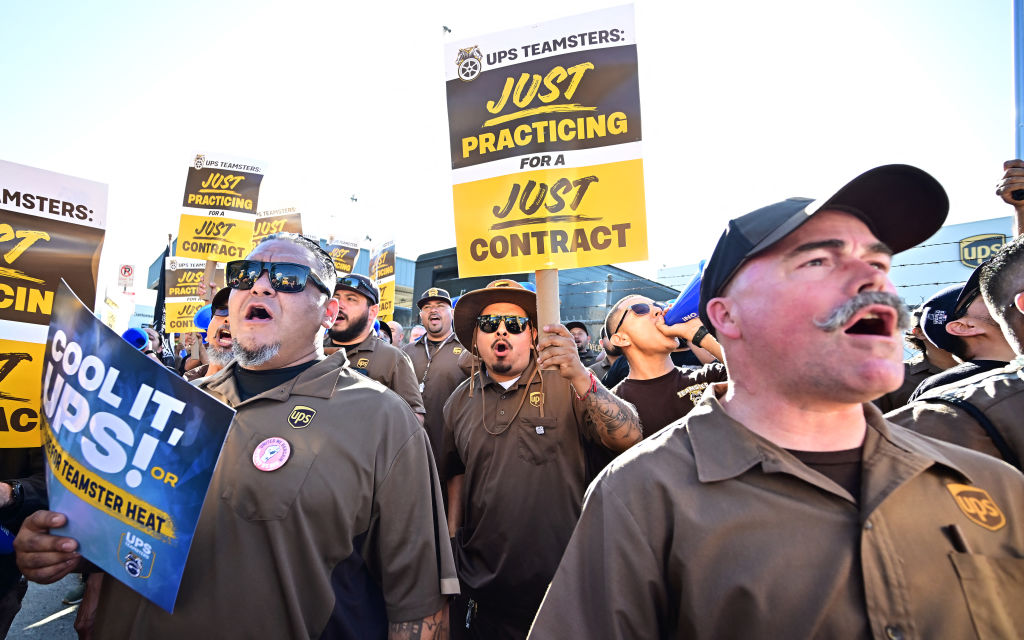Like many working-class people of color living in Los Angeles County, I work to support myself and my family. This includes my four younger siblings and single mother.
I work hard at UPS part time and just completed my degree in labor studies at California State University, Dominguez Hills. I’m a proud member of Teamsters Local 396, which represents transportation and sanitation workers in Southern California. As a shop steward, I apply my knowledge to help my co-workers at UPS advocate for themselves.
Every worker should be able to sit directly across from their employer to negotiate the working conditions they deserve. I’m honored to do that, serving on the UPS Teamsters National Negotiating Committee as we bargain our new five-year union contract covering more than 340,000 workers at UPS. We have had enough and we are ready for the contract we deserve at UPS.
Read More: What Climate Change Has to do With the Looming UPS Union Strike
Unfortunately, when we got to the part of negotiations where we bargain over wages, we hit a big roadblock. UPS walked away from the table on July 5, refusing to give the Teamsters a last, best, and final offer. It was disheartening to hear that from the employer I work so hard for, an employer that made a record-setting $100 billion last year. Part-time employees work extremely hard to make this company its profits, and we deserve to share in that success.
As thousands of UPS Teamsters practice picketed, rallied, and mobilized across the country, UPS bowed to the pressure, and on July 19, reached out to the union to resume negotiations next week. UPS needs to deliver a fair contract with the wages we deserve.
As a part-time worker at the UPS Compton hub, I make $18.85 an hour. UPS advertises that their jobs pay an average of $95,000 a year, but that’s not what I’m making. My co-workers and I struggle to make ends meet on low wages, especially in a state like California, which has among the highest living costs in the U.S.
Inflation is rising, and necessities like rent and food are becoming increasingly difficult to afford. Housing is a major expense for individuals and families. According to a recent National Low Income Housing Coalition report, a worker must earn an hourly wage of $42.25 and work full-time to afford a two-bedroom apartment in Southern California. For cities like Los Angeles, Berkeley, and San Diego, a single person must make more than $76,000 to “live comfortably,” according to the Massachusetts Institute of Technology Living Wage Calculator.
Income inequality in the United States has grown dramatically for decades. The wealthiest Americans are getting richer while the rest of us struggle to keep up. Prices for goods and services are increasing, but paychecks are not keeping pace. The result is a growing number of workers who are forced to choose between paying for rent or groceries, and that’s simply not acceptable.
This trend is reflected in the wages of part-time workers at UPS. UPS Teamsters are united around negotiating wages that respect the vital role we play in the company and the economy. The starting rate for a part-time UPS worker is $15.50 an hour. We do important work and are essential to the company’s success, but we are not paid accordingly. This is a multibillion-dollar corporation that can afford to do better by its workers.
Raising wages for part-time workers is the right thing to do. It’s also good for the economy. When workers have more money to spend, they put it back into their communities, supporting local businesses and creating jobs. This boosts economic growth and benefits everyone, continuing a cycle of shared progress.
UPS needs to raise wages, so this company’s workers can live with dignity and security. Part-timers at UPS, like myself, overwhelmingly want full-time jobs. We often have to wait years for that opportunity and, in the meantime, work for wages that cannot sustain an individual, let alone a family.
The best way for UPS to retain dependable workers is by paying us enough to live and creating opportunity. The system that currently exists at UPS means workers have to cobble together multiple jobs to make ends meet. This is not good for us, and it is not good for the company. It’s time for UPS to recognize the important role that part-time workers play in the company’s success and make some serious investments in our labor for the long-haul.
More Must-Reads from TIME
- Donald Trump Is TIME's 2024 Person of the Year
- Why We Chose Trump as Person of the Year
- Is Intermittent Fasting Good or Bad for You?
- The 100 Must-Read Books of 2024
- The 20 Best Christmas TV Episodes
- Column: If Optimism Feels Ridiculous Now, Try Hope
- The Future of Climate Action Is Trade Policy
- Merle Bombardieri Is Helping People Make the Baby Decision
Contact us at letters@time.com
